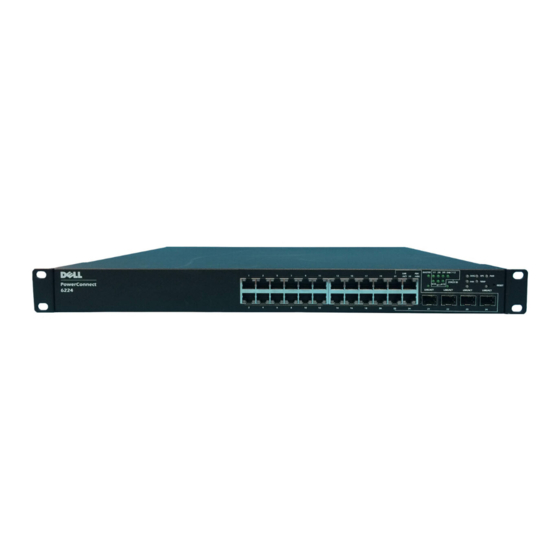- ページ 9
スイッチ Dell PowerConnect 6224FのPDF リリースノートをオンラインで閲覧またはダウンロードできます。Dell PowerConnect 6224F 34 ページ。 Powerconnect 6200 series
Dell PowerConnect 6224F にも: 仕様 (2 ページ)

PowerConnect 6224/6224F/6224P/6248/6248P Release Notes
Ping/Traceroute Enhancements
New ping options have been added to allow the user to specify the number and size of echo requests and
the interval between echo requests. A ping can now be initiated via SNMP using the MIB defined in RFC
2925.
New traceroute options have been added to allow the user to specify the initial and maximum time to live
(TTL) in probe packets, the maximum number of failures before termination, the number of probes sent for
each TTL, and the size of each probe. A trace route can be initiated in the web and SNMP user interfaces.
Static Reject Routes
Allows the user to configure a static route to discard the packets to a particular destination, thereby forcing
a black-hole routing behavior for a particular set of IP prefixes.
This can be done for the following reasons:
•
Prevent a routing loop in the network (default route configured on a router).
•
A preventive measure against a DOS attack on a router with unwanted destination addresses.
Clear ARP Cache Management Port
A new CLI command has been added to enable clearing of the ARP table of entries learned from the
management port.
OSPFv2 Point-to-Point Links
OSPF can treat an interface as a point-to-point circuit, even though the physical network is a broadcast
network. This simplifies OSPF operation on the link. OSPF does not elect a designated router for a point-
to-point network, and does not generate a network LSA to represent a point-to-point network in the link
state topology. This mode of operation is useful when there are only two routers attached to the link (either
a physical or virtual LAN).
In point-to-point mode, OSPF joins the AllSPFRouters multicast group on the interface and sends all OSPF
packets on the interface to AllSPFRouters. OSPF accepts packets received on point-to-point interfaces even
if the source IP address is not on a local subnet.
OSPVv2/v3 Summary Reject Routes
The area address range advertised by OSPF router at area boundaries as summary route into another area
can lead to routing loops in some situations. This feature can avoid situations where a routing loop can
occur in a network.
OSPF v2/v3 Passive Interfaces
Allows passive interfaces for OSPF implementations.
System Firmware Version 3.2.0.6
Page 7
